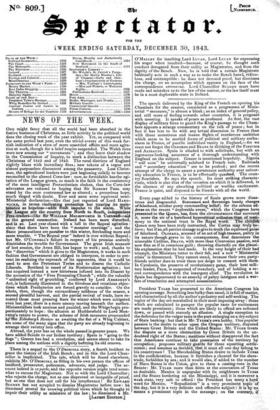NEWS OF THE WEEK.
ONE might fancy that all the world had been absorbed in the festive business of Christmas, so little activity in the political world does the closing week of the year exhibit. Yet, as compared with the same period last year, even the trivial events of this week fur- nish indication of a state of more unsettled affairs and more agita- tion at work, though for a brief respite suspended. The Welsh riots were new among our " movements " ; and they leave their shadow in the Commission of Inquiry, to mark a distinction between the Christmas of 1842 and of 1843. The rural districts of England nightly blaze with incendiary fires ; new tokens of a vague and almost purposeless discontent among the peasantry. Last Christ- mas, the agricultural leaders were just beginning sulkily to become reconciled to the altered Corn-law : now, so formidable has the agi- tation of the League grown, so much is the faith in the consistency of the most intelligent Protectionists shaken, that the Corn-law advocates are reduced to hoping that Sir ROBERT PEEL may stand by the once contemned law as altered ; a precarious hope, much tinged with doubt. Ever and anon some equivocal semi- Ministerial declaration—like that just reported of Lord HARD- WICRE, in terms vindicating protection but treating its main- tenance as hopeless—adds fresh impulse to the alarm. While the League stir the country from North to South, independent Free-traders—like Sir WiLmera Mor.nswoarn in Cornwall—aid in the general commotion. Ireland has been more disturbed, and is so. Last year closed with a lull in the Repeal agitation : since that there have been the "monster meetings" ; and the State prosecutions are peculiar to this winter, foreboding more and more trouble. " The Repeal year" indeed is over without Repeal ; but Mr. O'CoNNELL's failure in respect of his promise scarcely diminishes the trouble for Government- The great Irish measure of last session, the Arms Bill, has begun to work ; and, thanks to the "discretion" which it gives to the Magistrates, it works in such fashion that Government are obliged to interpose, in order to pre- vent its realizing the reproach of its opponents, that it would be used to arm the Protestant Tories and to disarm the Catholic Liberals. Scotland is eased of its Nonintrusion agitation ; but has acquired instead a new bitterness infused into its Dissent by the accession of the " Free Protesting Church"; while the valuable " unlimited right of grumbling," conferred by Lord ABERDEEN'S Act, is ludicrously illustrated in the frivolous and vexatious objec- tions which Presbyteries are forced gravely to consider. On the whole, then, though the extraordinary mildness of the season, a second plentiful harvest, and the partial revival of trade, have re- moved those most pressing fears for winter which were mitigated even last year, there is a more uneasy moving beneath the surface. Ministerialiats look anxious and puzzled, and the Whigs begin pro- portionately to hope : the allusion at Huddersfield to Lord MOR- PETH'S return to power, the scheme of Irish measures propounded by The Edinburgh Review as awaiting the fiat of a Whig Cabinet, are some of the many signs that the party are already beginning to arrange their reentry into office.
Abroad, the year has on the whole passed in greater peace. We have added Scinde to our Indian territory ; Spain is "going to the dogs "; Greece has had a revolution, and seems about to take its place among the nations with a dignity befitting its old renown.






















